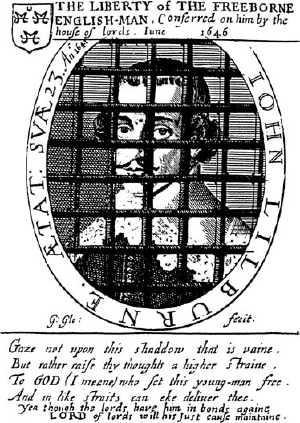Liberty Matters
Heterodox Reformers
 David Wootton raises a point that is pertinent not only to discussion of the Levellers, but also of past political thought and activism in general — what kind of vocabulary and labels should we employ in describing and analyzing these phenomena, and what kinds of analytical categories? As he says, there is a great danger of anachronism and the cardinal fault of presentism, but at the same time, this is unavoidable.
David Wootton raises a point that is pertinent not only to discussion of the Levellers, but also of past political thought and activism in general — what kind of vocabulary and labels should we employ in describing and analyzing these phenomena, and what kinds of analytical categories? As he says, there is a great danger of anachronism and the cardinal fault of presentism, but at the same time, this is unavoidable.One question this raises with regard to the Levellers is how to understand them, their thought, and their politics in religious terms. I agree with the point David made both in his shorter conversation piece and his original response: that we should understand their ideas and radicalism as fundamentally religious in nature. That is, they came out of answers to questions such as the nature of the relation between the individual and God; the order, nature, and governance of the Church; and the nature of both salvation and the Christian life. Clearly most of the Levellers came from the radical end of Protestantism, or Puritanism as it is usually called. Like David I think Walwyn was a possible exception to this, his latitudinarianism being so pronounced that he effectively moved out of that kind of discourse; he seems more like later figures such as Anthony Collins. For Overton and, even more, Lilburne it makes sense to see them as Reformed Christians of a particular cast. In that connection it is worth bearing in mind a point made by Rachel Foxley: that the people we can definitely identify as Levellers were members of a wider group of radical Protestants such as John Goodwin, Milton, Henry Marten, Hugh Peter, and Katherine Chidley (who probably should be counted as a Leveller). The Levellers can be seen as the members of that wider group who drew specific kinds of political conclusions from their shared outlook.
What specifically reformed beliefs can we discern among the Levellers and the wider group they were part of that produced radical political action and generated arguments that are still thought relevant today? One thing to note is that all of them were heterodox and skeptical not just of the arguments of the Caroline Divines, but also of standard Calvinism. Thus Goodwin was an Arminian, Overton a Baptist and a mortalist. The contrast can be seen in comparing the arguments of Levellers and fellow travellers to those of orthodox Puritans such as Prynne. One way of identifying people who belonged to this "set" is to see who were among the targets of Thomas Edwards's polemics. There are three particular ideas I would emphasize.
The first is the common Puritan idea of conversion as a process of self-discovery and self-realization. The idea and practice led to introspection and self-awareness, which in turn produced psychological individualism. The central aspect of that was the idea of a personal and ultimately subjective search for truth and salvation. For Levellers and others this meant a wide-ranging toleration of competing beliefs and practices because of the impossibility of establishing consensus or of evaluating the outcome of one person's conclusions over another's. It meant there could not be a visible and identifiable elect and reprobate since that status was ultimately known only to God. One conclusion was the view that Lilburne argued in several of his writings (e.g., The Just Defence of John Lilburne): that the search for truth produced a duty for all individuals to resist improper or unlawful acts by the authorities.
The second is the ecclesiology shared by all of the Levellers and many others on the radical wing of the parliamentary side: that of Independentism, or Congregationalism. This voluntary principle, as it came to be called later on, had obvious implications for the organization of the political order of a Christian commonwealth as well as its ecclesiastical structure.
The third was a view that David alludes to when speaking of Lilburne's references to God's law: the idea that ultimate sovereignty and law pertain to and come from God, but that crucially there is no institutional intermediary between God and the individual believer. (There was, for most at that time, an implicit intermediary between women and God, but even that is not clear for the radicals). Given that the personalism of the Levellers and others meant there was no clear knowledge of what God had decreed for human order and no authority to define it, human institutions must derive from and be created by individuals by a process of delegation and self-binding. It is this that under the political pressures of armed conflict and collapse of authority produces the new ideas about representation that Rachel emphasizes.
Copyright and Fair Use Statement
“Liberty Matters” is the copyright of Liberty Fund, Inc. This material is put on line to further the educational goals of Liberty Fund, Inc. These essays and responses may be quoted and otherwise used under “fair use” provisions for educational and academic purposes. To reprint these essays in course booklets requires the prior permission of Liberty Fund, Inc. Please contact oll@libertyfund.org if you have any questions.